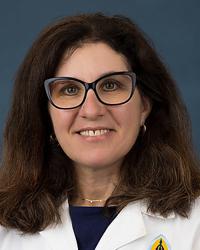Research Lab Results
-
Quantitative Imaging Technologies
Research in the Quantitative Imaging Technologies lab — a component of the Imaging for Surgery, Therapy and Radiology (I-STAR) Lab — focuses on novel technologies to derive accurate structural and physiological measurements from medical images. Our team works on optimization of imaging systems and algorithms to support a variety of quantitative applications, with recent focus on orthopedics and bone health. For example, we have developed an ultra-high resolution imaging chain for an orthopedic CT system to enable in-vivo measurements of bone microstructure. Our interests also include automated methods to extract quantitative information from images, including anatomical and micro-structural measurements, and shape analysis.
-
Rachel Damico Lab
Work in the Rachel Damico Lab explores topics within the fields of vascular biology and pulmonary medicine, with a focus on acute lung injury and apoptosis in lung diseases. Our studies have included examining idiopathic and scleroderma-associated pulmonary arterial hypertension, vascular receptor autoantibodies, and the link between inflammation and the Warburg phenomenon in patients with pulmonary arterial hypertension. We have also researched the inhibitory factor of macrophage migration and its governing of endothelial cell sensitivity to LPS-induced apoptosis. -
Rachel Levine Lab
The Rachel Levine Lab is interested in physician growth and well-being, best practices for advising medical students, and the experiences of women faculty and medical students in medicine.
-
Radionuclide Therapy and Dosimetry Research Lab
The Radionuclide Therapy and Dosimetry Research Lab is focused on modeling and dosimetry analysis of radionuclide therapy to support the translation of novel targeted radionuclide therapy strategies to the clinic. The research is divided between laboratory studies and patient-specific dosimetry, radiobiological modeling studies, alpha-particle dosimetry, and mathematical modeling of radionuclide therapy. The lab is currently engaged in pre-clinical research investigating targeted alpha-emitter therapy of metastatic cancer.
-
Radiopharmaceutical Therapy and Dosimetry Lab
The Radiopharmaceutical Therapy and Dosimetry (RTD) Lab has two missions: 1. Support clinical Radiopharmaceutical Therapy (RPT) trials by performing patient-specific dosimetry and developing novel methods that advance this field and illustrate the impact of a precision medicine approach to implementing treatment planning in RPT. This includes radiobiological modeling and microscale dosimetry calculations for alpha-particle emitter RPT. 2. Pre-clinical studies using novel alpha-emitter RPT agents with immune intact transgenic animal models that incorporate modeling and dosimetry to support the translation of novel targeted radionuclide therapy strategies to the clinic. In particular, identifying how to best combine RPT with complementary orthogonal-modality agents while also obtaining a basic understanding of how the treatment works and which variables have the greatest impact on efficacy and toxicity. The underlying objective is to utilize pre-clinical modeling and dosimetry to help identify an optimal therapeutic clinical trial design so as to reduce unnecessary human experimentation.
Principal Investigator
-
Rahul Koka Lab
Research in the Rahul Koka Lab focuses on pediatric airways, patient safety and health disparities. Recent studies have focused on the relationship between socioeconomic status and perioperative outcomes and patient safety factors related to interoperative cardiac arrests. We also performed effects analyses of the maintenance and repair of anesthetic equipment in various medical environments. -
Rakhi Naik Lab
The Rakhi Naik Lab studies sickle cell disease. We focus on complications related to the disease, including chronic kidney disease and venous thromboembolism. By defining the risks and factors for diseases related to the sickle cell trait, we hope to improve genetic counseling and screening and treatment recommendations. Other research in the lab examines the epidemiology and unique mechanisms of thrombosis in patients with hemoglobin disorders. Specifically, we are trying to identify mechanisms of hypercoagulability and develop treatments for patients with hemoglobinopathies.
-
Rao Laboratory
The Rao Laboratory studies the roles of intracellular cation transport in human health and disease using yeast as a model organism. Focus areas include intracellular Na+(K+)/H+ exchange and Golgi CA2+(MN+) ATPases. -
Rasika Mathias Lab
Research in the Rasika Mathias Lab focuses on the genetics of asthma in people of African ancestry. Our work led to the first genomewide association study of its kind in 2009. Currently, we are analyzing the whole-genome sequence of more than 1,000 people of African ancestry from the Consortium on Asthma among African-ancestry Populations in the Americas (CAAPA). CAAPA’s goal is to use whole-genome sequencing to expand our understanding of how genetic variants affect asthma risk in populations of African ancestry and to provide a public catalog of genetic variation for the scientific community. We’re also involved in the study of coronary artery disease though the GeneSTAR Program, which aims to identify mechanisms of atherogenic vascular diseases and attendant comorbidities. -
Ratchford Lab
Prospective registry looking at cardiovascular risk assessment and risk reduction among firefighters.


